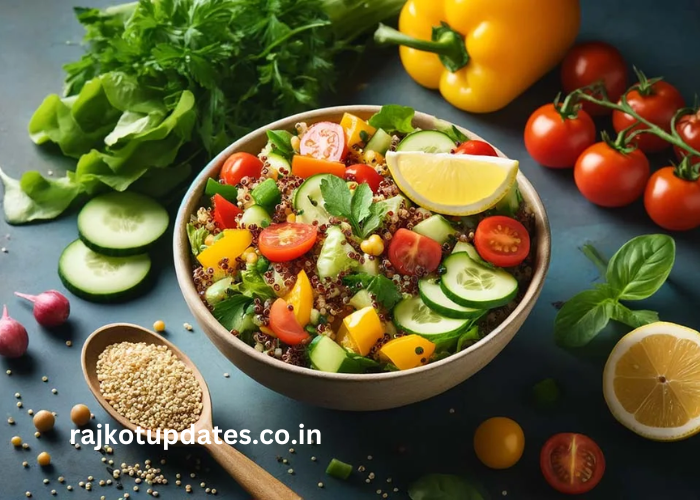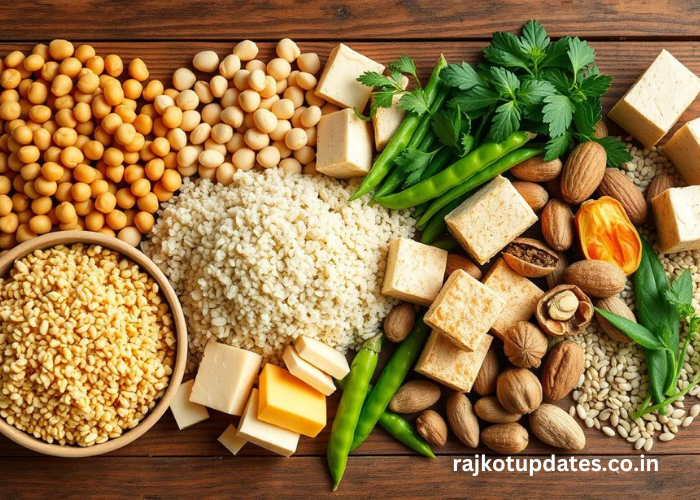Protein is an essential nutrient for the body’s growth, repair, and maintenance. While many people turn to animal products for their protein needs, there is a growing interest in vegetarian protein sources due to health benefits, ethical considerations, and environmental concerns. This article explores a variety of vegetarian protein sources, providing detailed insights into their nutritional profiles, health benefits, and how to incorporate them into your diet. Wellhealthorganic.com offers comprehensive information on vegetarian protein sources, helping you make informed dietary choices.
The Importance of Protein in a Vegetarian Diet
Protein plays a crucial role in various bodily functions, including muscle repair, immune response, and enzyme production. For vegetarians, obtaining adequate protein is vital, especially since they avoid meat, a primary protein source. Understanding the importance of protein and how to get enough from plant-based sources can help vegetarians maintain a balanced and nutritious diet.
Legumes: A Protein Powerhouse
Legumes, including beans, lentils, and chickpeas, are excellent sources of vegetarian protein. They are also rich in fiber, vitamins, and minerals. For example:
- Black Beans: Provide 15 grams of protein per cooked cup.
- Lentils: Offer 18 grams of protein per cooked cup.
- Chickpeas: Contain 14.5 grams of protein per cooked cup.
Incorporating legumes into soups, salads, and stews is an easy way to boost your protein intake.
Nuts and Seeds: Compact Protein Sources
Nuts and seeds are not only high in protein but also packed with healthy fats, fiber, and essential nutrients. Some of the top choices include:
- Almonds: Provide 6 grams of protein per ounce.
- Chia Seeds: Offer 4.7 grams of protein per ounce.
- Hemp Seeds: Contain 9.5 grams of protein per ounce.
These can be added to smoothies, yogurts, and baked goods for a protein-rich snack.
Whole Grains: More Than Just Carbs
Whole grains are often overlooked as protein sources, but they can contribute significantly to your daily intake. Examples include:
- Quinoa: Contains 8 grams of protein per cooked cup and is a complete protein, meaning it has all nine essential amino acids.
- Farro: Provides 6 grams of protein per cooked cup.
- Brown Rice: Offers 5 grams of protein per cooked cup.
These grains can be used in salads, bowls, and as side dishes to enhance your protein consumption.
Soy Products: Versatile and Nutritious
Soy products are a staple in vegetarian diets due to their high protein content and versatility. Key soy products include:
- Tofu: Contains 10 grams of protein per half-cup serving.
- Tempeh: Offers 15 grams of protein per half-cup serving.
- Edamame: Provides 8.5 grams of protein per half-cup serving.
Soy products can be grilled, stir-fried, or added to soups and salads for a protein boost.
Dairy Alternatives: Plant-Based Protein
For those who avoid dairy, there are numerous plant-based alternatives that provide protein, such as:
- Almond Milk: Contains 1 gram of protein per cup.
- Soy Milk: Offers 7 grams of protein per cup.
- Pea Protein Milk: Provides 8 grams of protein per cup.
These alternatives can be used in cereals, smoothies, and baking.
Vegetables: Surprising Protein Sources
Certain vegetables are surprisingly high in protein and can complement your diet:
- Broccoli: Contains 4 grams of protein per cooked cup.
- Spinach: Offers 5 grams of protein per cooked cup.
- Brussels Sprouts: Provide 4 grams of protein per cooked cup.
Incorporating these vegetables into your meals can enhance both nutrition and protein intake.
Protein-Rich Snacks
Healthy snacking is an excellent way to maintain protein levels throughout the day. Some protein-rich vegetarian snacks include:
- Greek Yogurt: Contains 10 grams of protein per 100 grams.
- Hummus with Veggies: Provides 2-3 grams of protein per serving.
- Protein Bars: Choose those made with plant-based proteins like nuts and seeds.
These snacks can help keep you satiated and energized.
Combining Protein Sources for Complete Nutrition
Plant-based proteins are often incomplete, meaning they lack one or more essential amino acids. However, by combining different protein sources, you can ensure you get a complete amino acid profile. For example:
- Rice and Beans: Together, they provide all essential amino acids.
- Hummus and Whole Grain Bread: This combination offers a complete protein source.
Experimenting with different combinations can enhance the nutritional value of your meals.
Protein Supplements: Are They Necessary?
For some vegetarians, especially athletes or those with higher protein needs, protein supplements can be beneficial. Options include:
- Pea Protein Powder: Offers 15-20 grams of protein per serving.
- Hemp Protein Powder: Contains 15 grams of protein per serving.
- Soy Protein Powder: Provides 20 grams of protein per serving.
These supplements can be added to smoothies or shakes for an easy protein boost.
Health Benefits of a Vegetarian Protein-Rich Diet
A diet rich in vegetarian protein sources can offer numerous health benefits, such as:
- Weight Management: Protein helps in satiety and reduces overall calorie intake.
- Muscle Maintenance: Essential for muscle repair and growth, especially for those engaging in regular physical activity.
- Heart Health: Plant-based proteins are often lower in saturated fats, which can benefit cardiovascular health.
Focusing on these protein sources can improve overall well-being.
Overcoming Common Myths About Vegetarian Protein
There are several misconceptions about vegetarian protein sources, such as:
- Myth: Vegetarians can’t get enough protein. Reality: A well-planned vegetarian diet can easily meet protein needs.
- Myth: Plant proteins are inferior to animal proteins. Reality: Plant proteins can provide all essential nutrients when consumed in variety.
Understanding and debunking these myths can help promote a balanced vegetarian diet.
Tips for Increasing Protein Intake
Increasing protein intake can be simple with these tips:
- Plan Meals: Ensure each meal includes a protein source.
- Snack Wisely: Choose protein-rich snacks like nuts, seeds, and yogurt.
- Use Supplements: Consider protein powders if you have higher needs.
These strategies can help you reach your protein goals effortlessly.
Cooking with Vegetarian Proteins
Cooking with vegetarian proteins can be enjoyable and nutritious. Some tips include:
- Experiment with Recipes: Try new dishes that incorporate legumes, grains, and soy products.
- Batch Cooking: Prepare large batches of protein-rich meals for convenience.
- Flavor Enhancements: Use herbs and spices to enhance the taste of protein dishes.
Exploring different cooking methods can make vegetarian protein sources a staple in your diet.
Conclusion
Incorporating a variety of vegetarian protein sources into your diet is not only possible but also beneficial for overall health. From legumes and nuts to whole grains and soy products, there are numerous options to meet your protein needs.
By following the tips and insights provided by Wellhealthorganic.com, you can ensure a balanced, nutritious, and protein-rich vegetarian diet that supports your health and well-being. Embrace the diversity of vegetarian protein sources and enjoy the numerous health benefits they offer.



